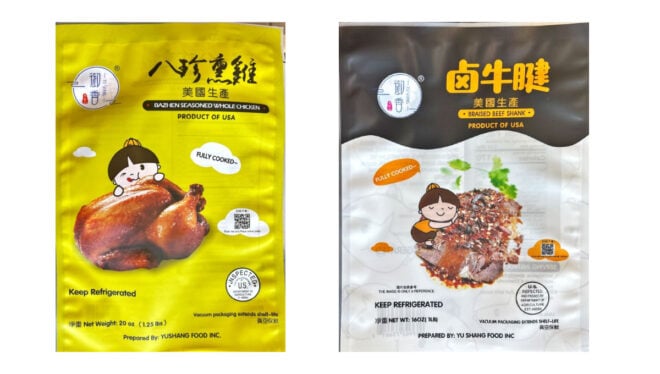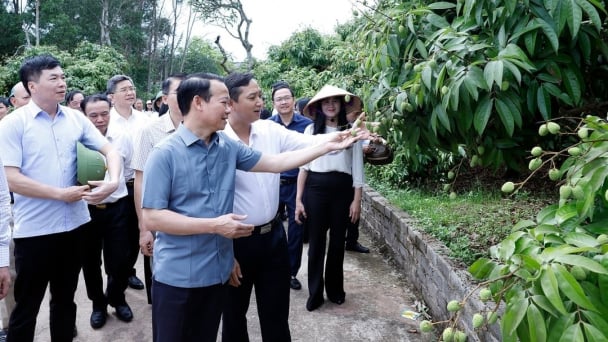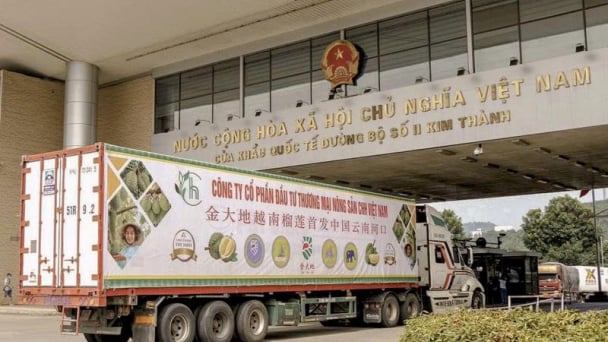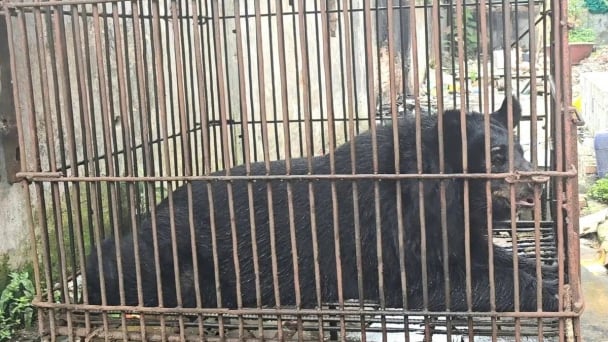May 14, 2025 | 08:02 GMT +7
May 14, 2025 | 08:02 GMT +7
Hotline: 0913.378.918
May 14, 2025 | 08:02 GMT +7
Hotline: 0913.378.918

The products subject to recall bear the establishment number “P-46684” or “EST. M46684” inside the USDA mark of inspection.
Yu Shang Food, Inc., a Spartanburg, SC, business, over the weekend recalled 4,589 pounds of ready-to-eat (RTE) meat and poultry products, which may have been adulterated with Listeria monocytogenes, according to the U.S. Department of Agriculture’s Food Safety and Inspection Service (FSIS).
The ready-to-eat meat and poultry items were produced from Oct. 21 to Oct. 27, 2024. Their “used by” dates range from Aug. 21, 2025, to Aug. 27, 2025. View the full product list. View labels.
The products subject to recall bear the establishment number “P-46684” or “EST. M46684” inside the USDA mark of inspection. They were shipped to retail locations nationwide and available for purchase online.
The problem was discovered after FSIS performed routine testing and follow-up activities on the finished product produced by Yu Shang Food, Inc. on October 21, 2024, which confirmed that the product was positive for Listeria monocytogenes.
Consumption of food contaminated with L. monocytogenes can cause listeriosis, a serious infection that often affects older adults, people with weakened immune systems, and pregnant women and their newborns. Less commonly, people outside these risk groups are affected.
Food contaminated with Listeria monocytogenes may not look or smell spoiled but can still cause serious and sometimes life-threatening infections. Anyone who has eaten any recalled product and developed symptoms of Listeria infection should seek medical treatment and tell their doctors about possible Listeria exposure.
Also, anyone who has eaten any of the recalled products should monitor themselves for symptoms during the coming weeks because symptoms of listeriosis can develop up to 70 days after exposure to Listeria.
Symptoms of Listeria infection can include vomiting, nausea, persistent fever, muscle aches, severe headache, and neck stiffness. Specific laboratory tests are required to diagnose Listeria infections, which can mimic other illnesses.
Pregnant women, the elderly, young children, and people such as cancer patients who have weakened immune systems are particularly at risk of serious illnesses, life-threatening infections, and other complications. Although infected pregnant women may experience only mild, flu-like symptoms, their infections can lead to premature delivery, infection of the newborn, or even stillbirth.
FSIS is concerned that some products may be in consumers’ refrigerators/freezers. Consumers who have purchased these products are urged not to consume them. They should be thrown away or returned to the place of purchase.
FSIS routinely conducts recall effectiveness checks to verify that recalling firms notify their customers of the recall and take steps to ensure that the product is no longer available to consumers. When available, the retail distribution list(s) will be posted on the FSIS website at www.fsis.usda.gov/recalls.
(FSN)

(VAN) Agriculture and environment sector experienced a 3.74% increase in growth during the first four months of 2025, with exports surpassing 21 billion USD. This growth was sustained by effective reforms and a trade surplus.

(VAN) Taiwan offers a promising market for Vietnamese turmeric; however, it enforces stringent standards, particularly concerning residual additives, colourants, and substances with potential carcinogenic effects.

(VAN) Through activities at Vietnam Sea and Island Week 2025, solutions will be developed to fully harness the potential and advantages of Vietnam's marine economy.
![Multi-channel, multi-directional Vietnamese agricultural markets: [4] EVFTA and the 0% tax advantage](https://t.ex-cdn.com/nongnghiepmoitruong.vn/608w/files/linhnhp/2025/05/12/day-chuyen-che-bien-tom-tai-1-nha-may-cua-sao-ta-205536_359-1044193.jpg)
(VAN) The near-complete elimination of import tariffs on Vietnamese goods makes the EVFTA the highest commitment the EU has ever made to a partner in its signed trade agreements.

(VAN) Deputy Minister Phung Duc Tien hopes that China will facilitate the entry of Vietnamese agricultural products into its market and accelerate customs clearance at border gates.

(VAN) On May 10, the Animals Asia Foundation and the Hai Phong Crop Production and Forest Protection Department successfully rescued a nearly 20-year-old sun bear that was being kept by locals.

(VAN) Does Hungary have an opportunity to expand poultry production in the coming years despite the pressure from avian influenza and challenges of the trade war?